Making something a household name is far from being a cakewalk. And making a brand the most ubiquitous name across the country must have needed a lot of strategy and planning, with a dash of magic and charm. The death of pioneering adman Sylvester daCunha marks the end of an era — an era highlighted by indubitably the most recognisable Indian advertisement campaign of all time, which weaved the name of Amul into the social fabric of the country.
In 1966, founding chairman of the Gujarat Cooperative Milk Marketing Federation, Verghese Kurien brought Sylvester daCunha, the then managing director of advertising agency ASP on board to create a campaign for Amul that would resonate across classes and be a tender, safe connection between mothers and children. Teaming up with illustrator Eustace Fernandez, the duo birthed the Amul Girl and the Utterly Butterly Delicious campaign — marking the inception of the longest running advertising campaign in the world, according to the Guiness Book of World Records.
The late 1960s market saw a heavy influx of foreign brands, establishing a footing in the market. Amul needed a campaign that would grab attention, but more importantly, convince the populace of its quality and importance. To compete against Polson’s butter girl, daCunha needed to cater to what Verghese wanted — something easy to sketch and something memorable, the two absolute requisites for any outdoor hoarding campaigns in those days.
Capturing the essence of Amul, daCunha and Fernandez sketched out a noseless cherubic girl in red polka-dotted frock, blue hair and a naughty smirk on the face, contrasting Polson’s well-mannered and reserved butter-girl. A little girl, which every family could relate to, the mascot keeps defining the ethos of the brand, and has become synonymous with billboards across cities, early morning news and any major event. The Amul Girl has been a very significant instrument of socio-political commentary and untethered artistic expression for more than five decades, with punny and tongue-in-cheek depictions of every possible event across the spectrum, known as the Amul Topicals. A 2016 article by Shashi Tharoor revealed that daCunha fashioned the wide-eyed girl out of Shashi Tharoor’s sisters, Shobha and Smitha, and his own voice and spirit.
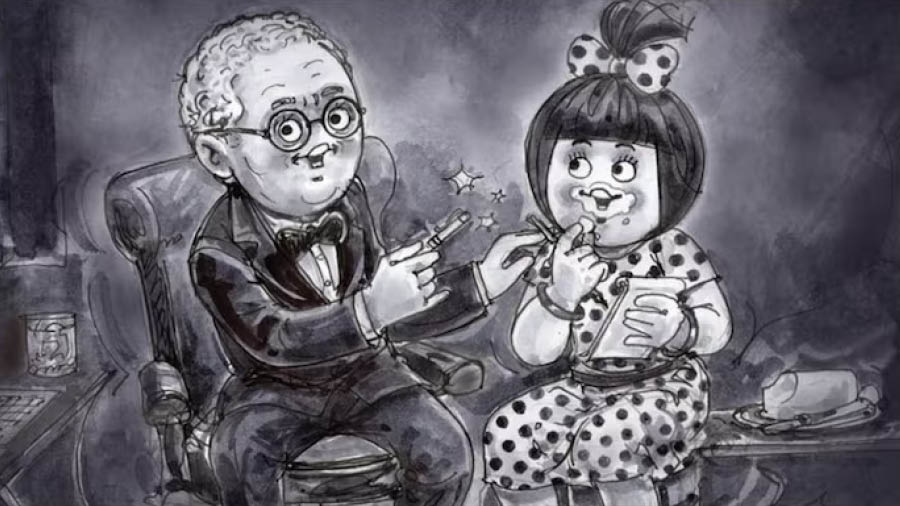
Amul's tribute to daCunha Amul
The Utterly Butterly Delicious campaign became a raging success and has continued to hold major relevance across decades of technological and political evolution. daCunha gave agency and identity to a brand born out of revolutionary advancements, and it keeps being equally recognisable in an era brimming with modern tech-enhanced adverts and countless brands jostling to etch a mark. Be it sports, politics, natural disasters or landmark films, the Amul Girl has always had something to say, just like an inquisitive child, or an expressive adult who likes puns, like all of us. daCunha carved the road for numerous comic artistes and set strong a culture of unbiased expression in the most politically volatile era post Independence, with Amul Topicals. In the cheekiest and most subtle of ways, from hoardings to newspapers, daCunha kept Amul’s legacy and its treasured funny bone unsoiled and uncompromised.
Commenting on daCunha and the campaign’s legacy, Anurag Hira, the noted advertising professional on a sabbatical, said, “Looking back, the real strength of the Amul campaign, if you ask me, lies in the fact that it doesn’t sell the product directly, but places the brand inside the mind and the popular psyche and says what the Indian mind is thinking. While Sylvester daCunha is becoming a household name post his demise, a few of us in the business (probably) know that it was his art director Eustace Fernandes, who helped create the magic. In Mr daCunha’s words, ‘The greatest thing about Eustace’s girl is the round face that can be adapted to be anybody. With Manmohan Singh, we can put a turban on her. It could be Indira Gandhi, with just a white streak. So it was a supremely adaptable creation. Such topical currency was not part of the original ‘moppet’ idea and that’s exactly why the campaign has continued to be such a success — because it kept up with the times, and wit and humour were integral ingredients. Lastly, a long, standing ovation to the client for not changing, much like the much-loved butter, these ingredients of topicality with wit and humour, in such a long-lasting communication (sic).”
My Kolkata revisits a few of the campaign’s most iconic adverts over the years…
The Beginnings:
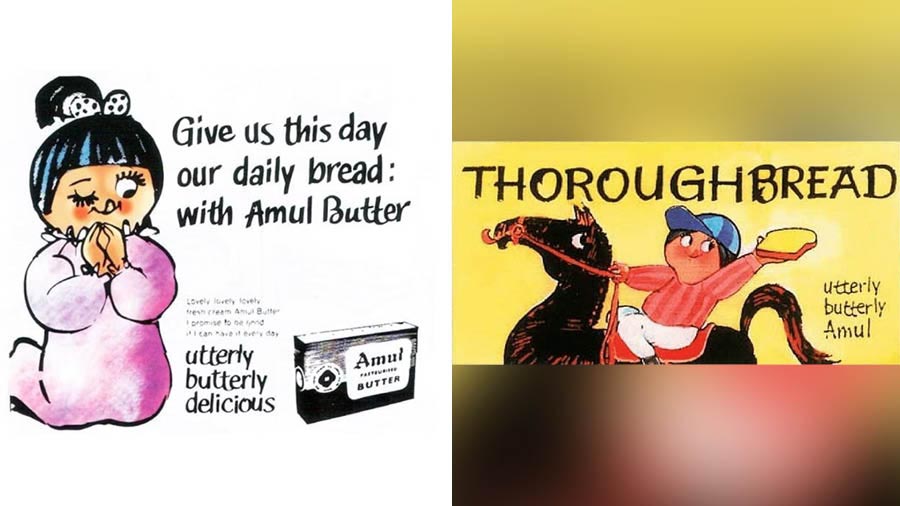
Amul
(Left) The first Amul hoarding featured the Amul Girl in prayer, uttering the words ‘Give us this day our daily bread: with Amul Butter’, which was an instant hit; (right) the first topical came in 1966 when Amul cracked a pun on the word 'thoroughbred' during Mumbai’s horse racing season.
Political Tea:
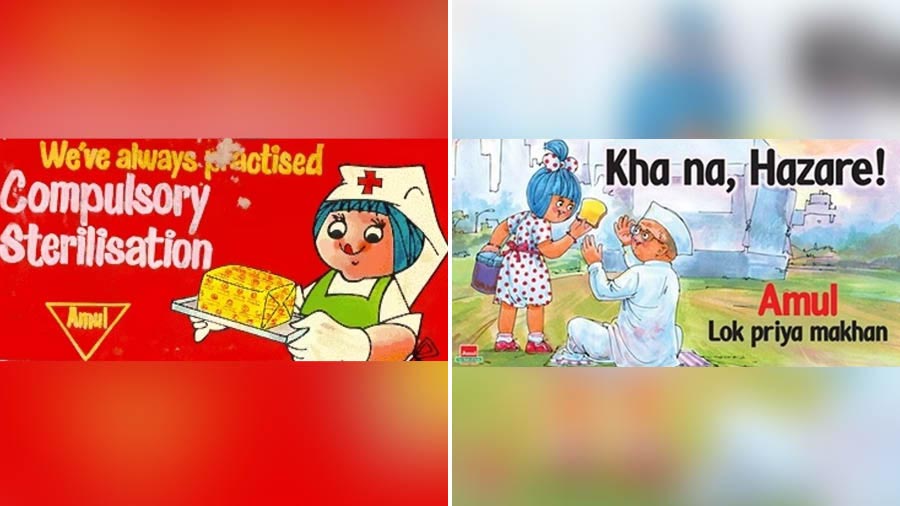
Amul
(Left) With Verghese Kurien backing daCunha, they managed to put up unabashed adverts like this from 1976, which came as a sharp comment on Sanjay Gandhi’s mass sterilisation drive; (right) Amul has always managed to tickle the political vein, and this 2014 advert was yet another cheeky masterstroke portraying Anna Hazare’s 2011 hunger strike until the government passed the anti-corruption bills.
The Line of Controversy:
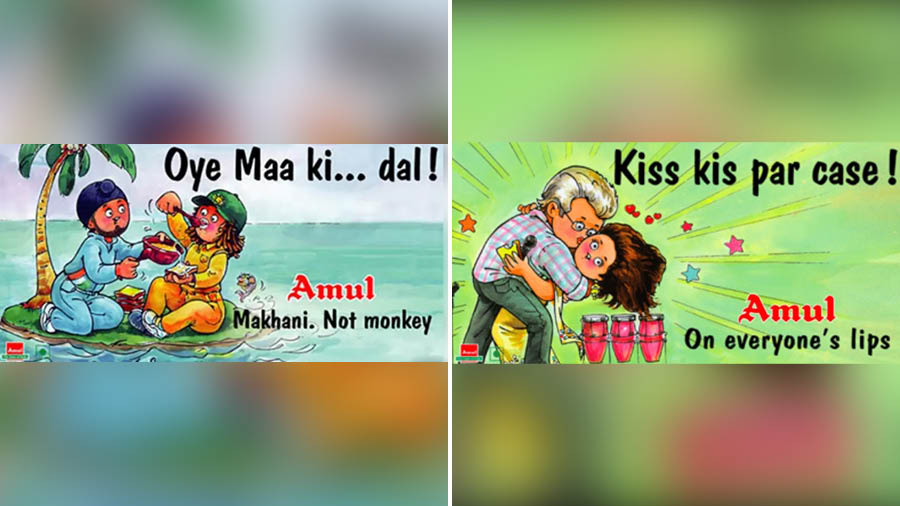
Amul
Like a nosy neighbour, Amul has had a sharp jibe at everything controversial; (left) following the 2008 monkeygate scandal involving Harbhajan Singh and Andrew Symonds, where the latter accused the former of uttering a racial slur (monkey), while Harbhajan defended his stance saying he had uttered a common regional slur (maa ki); (right) Following the controversial and uncomfortable Richard Gere-Shilpa Shetty kissing scenario in 2007, Amul played the right cards.
The filmbuff:
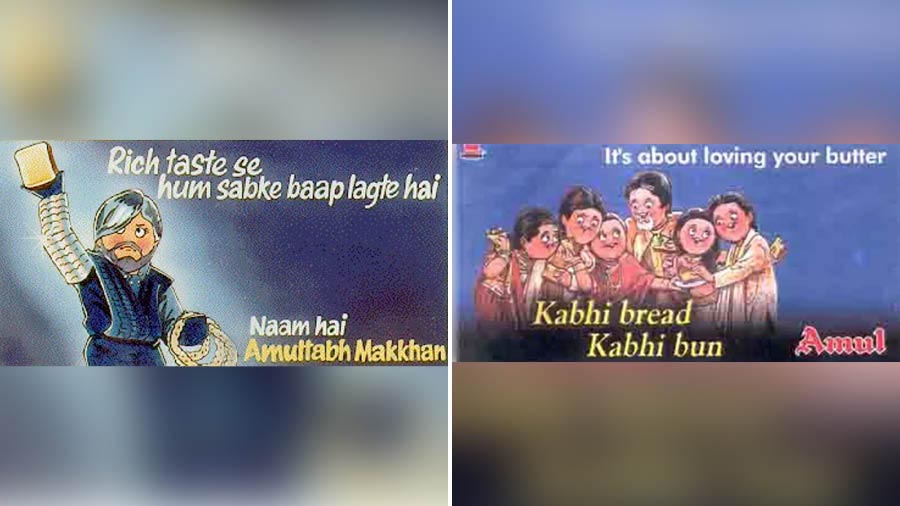
Amul
Amul has had their rich share of puns on the cinema front as well. (Left) Following the success of the 1988 blockbuster Shahenshah starring Amitabh Bachchan; (right) Amul brought their best pun game to the 2001 Karan Johar film Kabhi Khushi Kabhi Gham advert, fiddling with the title and the tagline of ‘It’s all about loving your parents’.
Sporty as it comes:
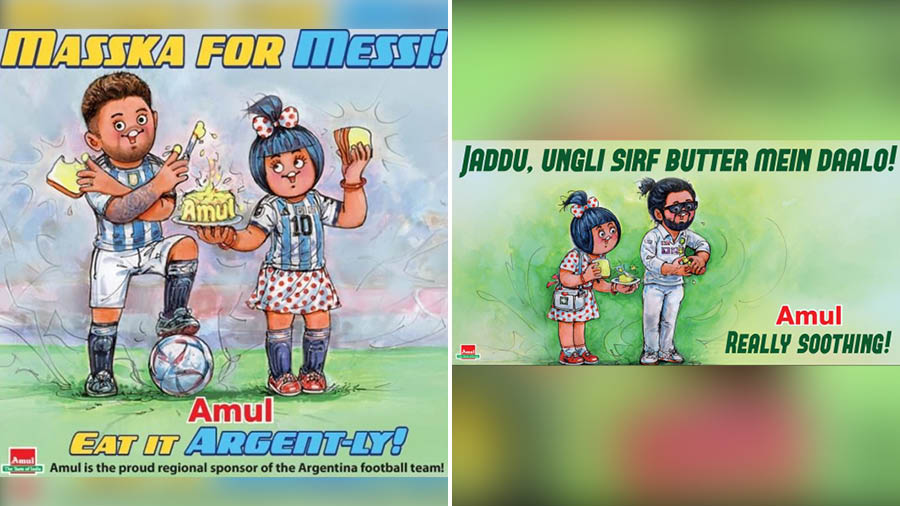
Amul
The Amul Girl has also been quite a sports enthusiast, with sharp comments on contemporary sporting events. (Left) Amul celebrated a landmark collaboration as they became the official regional partner for the Argentina Football Federation (AFA) during the 2022 FIFA World Cup; (right) Following Ravindra Jadeja's balm-on-the-finger fiasco during the Nagpur Test against Australia in February, 2023, Amul didn’t spare the opportunity to come up with a cheeky one-liner.


